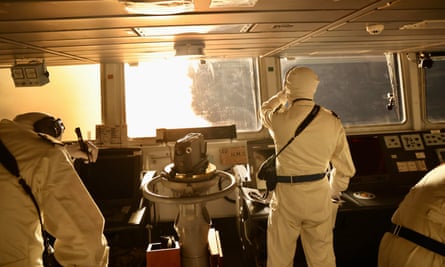The United States and the United Kingdom issued a warning of potential repercussions following the joint defense efforts of their warships, which successfully defended against 21 attacks from Houthi rockets, drones, and cruise missiles in the Red Sea.
According to Antony Blinken, the US Secretary of State, possible future attacks from Yemeni rebels on global shipping may result in a military response from Western countries. There are speculations that the United States could potentially target military sites with airstrikes in order to deter future raids.
“I will not publicly reveal or hint at any potential actions,” stated Blinken during his visit to Bahrain. “As we have previously stated, if this behavior persists, there will be repercussions, as seen yesterday.”
During a press briefing, British Defence Secretary Grant Shapps urged reporters to stay tuned and explicitly accused Iran of providing support to Yemeni rebels through intelligence and surveillance.
Shapps stated that Britain, along with its western allies and Saudi Arabia, were in agreement that the ongoing attacks on warships and merchant ships in the southern Red Sea must be stopped. He also did not dismiss the possibility of targeting Houthi military sites on land.
Before the press conference, the defense secretary issued a statement stating that the UK, along with its allies, has already stated that the illegal attacks are not tolerated and if they continue, the Houthis will face consequences.
On Wednesday evening, the United Nations Security Council approved a resolution denouncing and calling for a prompt cessation of Houthi assaults.
The United States and Japan have introduced a resolution stating that numerous Houthi assaults are obstructing international trade and threatening both navigational rights and regional stability.
There has been talk of the US and its allies potentially taking action to prevent maritime disruptions caused by Houthi attacks. This could involve striking the rebel group’s missile sites, radar stations, and other military locations.
Last week, the United States, United Kingdom, and 10 other countries from the western world released a joint statement reiterating their warning to the Houthis regarding the consequences of their ongoing attacks on merchant ships in the southern Red Sea. Approximately 15% of global maritime trade typically passes through the waters south of the Suez Canal.
Shapps stated that the recent missile and drone strike, which occurred at 9:15pm on Tuesday, was an increase in intensity. Despite the previous warning on January 3rd causing a brief halt in attacks, he noted that the events of last night have altered the situation once more.
He suggested that individuals should come to logical conclusions based on that information.
The HMS Diamond successfully intercepted and destroyed seven drones of Iranian design, according to Shapps. He also suggested that the British ship may have been a potential target of the Houthis.
According to the US Central Command (Centcom), there were three US destroyers and F18/A warplanes deployed from the USS Dwight D Eisenhower aircraft carrier to help defend against the attack. Fortunately, there were no reported casualties or damage.
According to Centcom, the Houthis, who are supported by Iran, carried out a sophisticated assault using Iranian-made unmanned aerial vehicles (UAVs) that can only be used once, as well as anti-ship cruise missiles and an anti-ship ballistic missile. This attack was launched from areas in Yemen controlled by the Houthis and targeted the southern Red Sea region.
It was the most sustained and complex assault by the Iran-backed group since the Houthi force governing Yemen from the capital, Sana’a, began attacking shipping in the southern Red Sea from mid October, in support of Hamas in its war with Israel.
A representative for the Houthis, previously regarded as a small, localized military group, declared that the assaults will persist “until the blockade on Gaza is lifted.” The group also stated that an American ship was attacked because it was aiding the Israelis.
The defence secretary of Britain openly accused Iran of aiding the Houthis. He stated, “I have no doubt that the Iranians are strongly supporting the actions of the Houthis, including providing ISR capabilities.”
Earlier disclosures from the United States have indicated that a paramilitary surveillance ship from Iran is gathering information on shipping activity in the southern Red Sea and sharing it with the Houthis.
Since mid-October, there have been 26 incidents, causing many shipping companies to avoid using the Red Sea naval route and resulting in increased prices.
According to Shapps, HMS Diamond successfully defended against the biggest assault to date by the Houthis, who are backed by Iran, in the Red Sea. He also noted that the Royal Navy has referred to the ship as a valuable asset and it was able to take down numerous attack drones using its guns and Sea Viper missiles.
The cost of each Sea Viper/Aster missile ranges from £1m to £2m. While the exact number of missiles launched is unknown, it is likely that the Houthis used cheaper one-way attack drones, such as the Iranian Shaheed 136 and its variations, which are estimated to cost around $20,000.
The UN Security Council was expected to approve a resolution in New York on Wednesday denouncing the actions of the Houthis, but not permitting the use of force. It is uncertain if any other nation, specifically France, would be open to participating in potential retaliatory measures with the US and UK against the Houthis.

The Houthis officially declined the request from the west in a letter to the UN, and then proceeded to launch a military attack that limited the choices for Centcom.
The proposal to classify the Houthis as a foreign terrorist organization, which was previously revoked by President Joe Biden at the beginning of his presidency, has been abandoned as an alternative solution.
The Houthi military representative stated that they conducted an operation using a significant amount of ballistic and naval missiles and drones, aimed at an American vessel that was offering assistance to Israel. This operation was in retaliation for the deceitful attack on our naval forces by the American enemy.
Officials from the West are currently in talks to determine which nations would be willing to participate in a potential military strike on Yemen. The primary focus is on whether or not French vessels would be involved in targeting coastal radar systems.
The topic being debated is whether the US will launch a single retaliatory strike or engage in a sustained operation to locate the mobile locations from which the Houthis are launching missiles.
According to projections from the shipping industry, Whitehall predicts that prolonged disruptions in shipping could result in a 0.2-0.5% increase in inflation worldwide. This would have the greatest impact on Egypt’s economy, as the loss of commercial shipping through the Suez canal would heavily affect their finances.
Privately, Saudi Arabia and the United Arab Emirates, two countries that have battled with the Houthis in the nine-year Yemen civil war, are said to be sympathetic to military action against the Houthis but are wary of being seen to support US-led military action against a group that has won extensive popular support for its acts of solidarity with Gaza.
The United Kingdom has been actively engaging with Oman and Iran, who have significant control over the Houthis, in order to convey the message that the actions of the Houthis are not acceptable and could jeopardize the progress of the Yemen peace plan.
Some believe that the group’s actions hinder the Houthis from being viewed as a reliable player on the global platform, potentially preventing them from being included in a government in Yemen alongside the UN-recognized government in the southern region.
The cautions about halting the peace negotiations, which come after discussions between the Houthis and Saudi Arabia in the previous year, are likely seen as the most effective means for the west to influence the Houthis besides using force and imposing penalties.
During the initial six-month period of the peace plan, tens of thousands of public sector employees would receive payment for their outstanding salaries. These payments will be based on 2014 payrolls and will be funded by Saudi Arabia.
A potential military disturbance could also reduce the income gained by the Houthis from tariffs and fees, totaling over $1 billion annually, collected from ships that enter the Houthi-controlled port of Hodeidah.
Source: theguardian.com

















